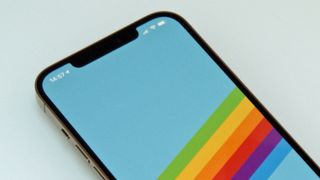iPhone 13 could feature in-screen Face ID or Touch ID unlock
So long to the notch?

Having been largely responsible for introducing the smartphone display notch with the iPhone X, Apple is now busy trying to get rid of it: new patents have revealed the company's plans to embed its Face ID and Touch ID tech underneath the screens of its mobile devices rather than in a cut-out or bezel.
The snappily named Photodetectors Integrated into Thin-Film Transistor Backplanes patent, as spotted by Apple Insider, goes into an impressive amount of technical detail about how a display can be layered.
Photodetectors integrated into the screen "may be used to obtain biometric information, such as fingerprints, palm-prints, 3D face scans, or retina scans" explains the patent filing. "The biometric information may then be used to identify or authenticate a user."
- You might struggle to find the Huawei P50
- The Asus ROG Phone 5 is coming very soon
- Samsung has thoughts on the future of TV
That sounds very much like Face ID and Touch ID to us – and maybe something even more advanced further down the line – and having all of this technology built into the display would mean that Apple might be able to shrink down the notch or remove it completely.
Coming soon-ish?
The key to any kind of innovation like this is keeping both the screen and the sensors underneath it functioning to an acceptable level. In-screen fingerprint sensors have already been around for a while, but even though phones with in-screen selfie cameras are now on sale, the results have been less than stellar.
Apple won't want to launch any kind of technology like this until it's ready, so it might be too early in its development for the iPhone 13. Further down the line, it might also be incorporated into a future Apple Watch – rumors of the wearable getting Touch ID support have been swirling for a while.
Indeed, the patent itself mentions reducing "the cost, size, complexity, part count, or manufacture time of the sensor or sensor system", as well as finding ways to "improve the sensitivity or speed" of the setup, so it's unlikely to arrive half-baked.
Get daily insight, inspiration and deals in your inbox
Get the hottest deals available in your inbox plus news, reviews, opinion, analysis and more from the TechRadar team.
And as always with patents, it's worth remembering that they're not a guarantee of features arriving in devices: they can only tell us what companies are thinking about and exploring in their research departments. It would make sense for Apple to be investigating this type of tech though, and ultimately looking to banish the notch for good.

Dave is a freelance tech journalist who has been writing about gadgets, apps and the web for more than two decades. Based out of Stockport, England, on TechRadar you'll find him covering news, features and reviews, particularly for phones, tablets and wearables. Working to ensure our breaking news coverage is the best in the business over weekends, David also has bylines at Gizmodo, T3, PopSci and a few other places besides, as well as being many years editing the likes of PC Explorer and The Hardware Handbook.
